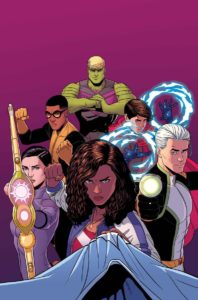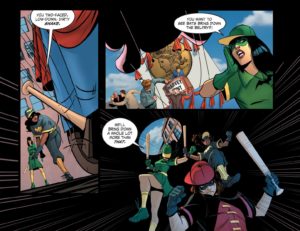Queer, trans, and queer trans people have been leading the fights of activist movements for many, many years. Queer folks’ contributions are often overlooked, but from LGBT movements, like Stonewall, to modern movements, like Black Lives Matters, trans women of color, in particular, have been on the front line fighting for the advancement of society. They are heroes. Heroes are reflections of their times; they are to show us the best of us, the best people, but yet they don’t represent or real heroes. Much like the history books, superhero books seem to ignore the existence of queer people, trading them in for the cisgender straight white men who take the credit for advancement, especially since they get to write the history books.
The very existence of queer people is an act of defiance. We deny the binaries presented to us at birth and march forward even knowing we may lose friends, family, jobs, and place a target on our backs. Fearlessly we are heroes in real life, and that real life heroism comes just from living truthfully. It’s why metaphors simply don’t serve as representation. Why didn’t the X-men have trans women on their team after Stonewall; why are they so white in general? You can be a metaphor and represent communities at the same time. Pretending that welcoming elves, mutants, aliens, etc., are as good as having real marginalized people in your books is awful.
Queer people should be the leaders of teams, the people at the forefront, ready to risk their damn lives to make changes. It’s often said by progressive people that superheroes are social justice warriors, and I agree. However, it also has to be said that superheroes represent exactly what’s wrong with power structures in real life activism. Only in comics do we see queer people totally erased or kept small so as to not make any given title “a gay book,” since only so many of them can be sanctioned in any given year before a big publisher fears it will hex itself and suddenly become North West Press (who are great, call me).

What’s even odder is the lack of queer youth being represented in superhero comics. J. Walter Thompson found that 52% of generation Z (the generation after them damn millennials like me) identified as not totally straight in North America. Similarly, Yougov found that only 46% of teens surveyed identified as totally straight in Britain. While these are only two studies, it’s hard to deny the overwhelmingly large number of open and active queer youth all over the net, be it on sites like Tumblr or elsewhere. Queer people have taken on online activism and community building, really forming it into its modern state. While there may be issues in some approaches, there’s no denying that we have a generation of very socially active youth who are attempting to learn and grow.
That’s why books like Teen Titans, Champions, and more having zero openly confirmed queer characters is just baffling. These are teams of young people working to make social change; even ignoring the statistics it just seems reasonable to assume that a good portion, if not most of them, would be somewhere other than the “default” on the spectrums of gender and sexuality. We are lucky to have had books like Young Avengers, but sadly that is an outlier in the way young adults are written. Champions issue 2 has the only (female) character with no confirmed sexuality show a romantic interest in a man. And Teen Titans shows no signs of depicting queer relationships between its characters.
Sadly, even looking at the bits of promised queer representation it seems the mostly older, cis/het white men who get to write teen team books are more in love with the imagined drama of being queer then the reality of being queer. Rewinding back in time like the flash to DC Rebirth #1, we saw Aqualad from Young Justice seeming to finally make it to the comics, and he was gay! However, his mom hated that about him. We get just a few passing moments with a young adult hero, and it’s him as a young person of color who happens to be gay having to deal with homophobia instead of being a hero. This is pretty common when we get our brief moments with queer people inside these teams.
As mentioned earlier, trans women of color have led the charge in activism. Even with the high risk of violence against us, the community fights hard. However, the few counts of trans women in superhero books (let alone trans women of color) is pathetic. While I am not sure how public the information is, I heard a lot about Batgirl of Burnside having big plans for trans woman of color Alysia Yeoh, but I was assured that the team was against making her a superhero. It baffled me that they were so against it. Since that time, they are no longer working on the book, and Alysia is more or less forgotten in both Batgirls books. Alysia does get to be one of many batgirls in DC Bombshells, albeit in a very, very small role. In addition, we had two other trans people of color in the big two recently: Porcelain (Secret Six, DC) and Sera (Angela series, Marvel). Both of these characters actually got to be powerful, if not exactly heroic, having magical tricks of their own. Sadly, both of these characters have vanished this year as well.

What I want to focus on here is the idea that trans women aren’t allowed to be powerful. Alysia as a superhero was a seed the Batgirl creative team planted in their fifth issue when predictive justice Batgirl identified Alysia as a potential vigilante. But they didn’t think that was worth touching on further. The following Batgirl teams have so far also found the idea of promoting Alysia as uninteresting. Meanwhile, any trans person with power seems to be a particular creative teams baby, and once that person leaves it seems they just vanish, be it Bendis seeming to erase Sera from Angela’s story in his Guardians of the Galaxy run or the DC writers just ignoring most of the Secret Six characters.
Queer people have rarely been allowed to carry their own titles, in particular in an own voice fashion, but it’s shocking that in mainstream superhero books no trans person has ever lead a book. Sure, we have Rachel Pollock‘s Doom Patrol, and I would argue that Sera in Angela Queen of Hel is the main character, not Angela, but I digress. What we are seeing is a constant erasure of our contributions; even the small characters we do get aren’t ever going to be good enough for these companies to allow them to headline. It took years for Marvel to finally greenlight America Chavez getting a solo, even though scripts have been floating around with her for years. Similarly, at DC it’s no shocker that Batwoman had to take time off of having a book after DC–in spite of the acclaimed creative team leaving–put Kate through one of the worst stories they could have done. Hell, and does Valiant even try? They have a years-old superhero universe, but anytime I look at their books it appears their universe is 100% cis/straight white and mostly male.
While some people fear that the gay people are taking over, in reality, we in the LGBT community actively seem to be getting less representation. Recent additions like Iceman’s sexuality are low ball safety plays for headlines. The reality was that people didn’t care nearly as much about Bobby as they did about many of the other queer headcanon characters in the X-men universe. Before Bobby’s reveal Marvel editors blocked Gambit from being bisexual and after they stopped Quicksilver and Namor from being bi. Then Marvel has recently brought up for Iceman’s solo series that they had noticed fan theories. Well, if they were checking then clearly they would know that the queer subtext in Claremont’s run of X-Men has been painstakingly fleshed out by fans, and Kitty Pryde, Storm, and so much more should also be “changed.” We don’t have nearly as much as we should, even when all the same things add up.
It’s just plain bullshit that queer people are not being reflected in our comic hero universes. Webcomics, like Blue Valkyrie and Goodbye to Halos, are amazing own-voice stories that can’t be touched. However, we need these stories coming out of the big publishers too. Not because their stories matter more, but because queer people deserve to be paid and to have a shot at the mass media exposure granted by being in these larger universes. Queer people have dealt for years and years with all straight universes. The least publishers and fans can do is to support us, give us time to grow characters, and really give us a chance to share and spread high-quality content.
Until we have real diversity, true inclusivity, we shouldn’t be thankful for the scraps we are presented with. Enjoy them–go ahead we should enjoy good books–but don’t be thankful for getting the leftovers while everyone else gets an all-you-can-eat meal. At the end of the day, they owe us, they owe our community, and we aren’t getting the shit we deserve. Often we are tasked and put to blame for any failure of a comic related to our community, but don’t feel the guilt. We have to push forward for good inclusivity, for a future where an article like this looks silly, where it’s no longer headline news that someone is queer or that a queer lead title exists. Queer people have been fighting for a better tomorrow, and it’s about time comics gave them to us.

